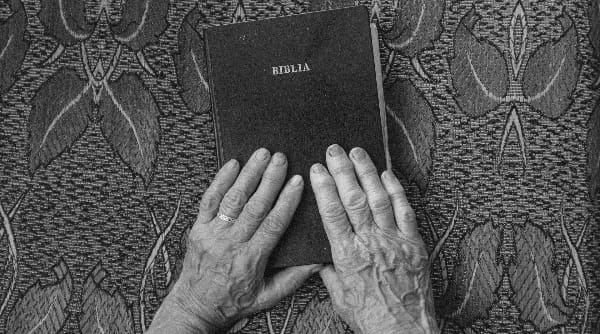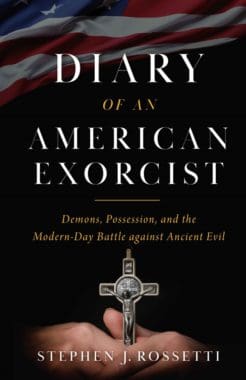Facing Lucifer
The team and I spend a lot of time dealing with lower-ranking demons. Most people who are possessed have such lesser demons. Thank God. If we get their names during the exorcism, they are not commonly known.
Occasionally we run into a higher-ranking demon, and then it gets rougher. These are the more well-known princes of Hell, such as Beelzebul, Baal, Leviathan, Gressil, and Asmodeus. There are moments when Lucifer himself shows up. These are rare. Some demons who inhabit the possessed claim to be Satan or Lucifer but are usually lower-ranking demons perhaps under their direct command. When Lucifer shows up, he is typically surrounded by Hell’s princes and many, many others. This is ugly.
During a recent session, I was interrogating the demons and commanded them to tell me who was the leader of the possessing demons. The demonic spokesman answered with an arrogant sneer, “The King of Hell himself is our leader.” He added, “You’re way out of your league.” Later they confirmed that it was Lucifer himself. Ugh.
We had been exorcising this person for a year and a half, and after all the lower demons had been cast out in Jesus’ name, including Hell’s princes, Lucifer himself finally came to the fore. His personality was unique and unmistakable. He came forward with a hiss that sounded like a snake. He was not like the lower demons, who were often superficially boastful, adolescent, and shallow. Despite their innate intelligence, they acted quite stupidly.
Lucifer, whose name is often translated as “Light Bearer” or “Morning Star” (Isa. 14:12), was brilliant, cunning, measured, and deadly. Lower demons cower in the presence of a priest, but Lucifer did not. Later, I consulted an older exorcist, who said, “They are trying to intimidate you to see if there is any lack of confidence in you, which they will pursue.” He added, “Don’t take the bait.”
It would be a tough spiritual battle, but the team and I had to trust. Lucifer had a very strong army. He marshaled all of his considerable resources, including the princes of Hell and hundreds of demons. But we had the power of Heaven: the Blessed Virgin Mary, the saints and angels, and, of course, Jesus Himself. We couldn’t lose.
I invoked the Blessed Virgin Mary and prayed the Church’s official Rite of Exorcism, with our lay team praying the litanies. The “King of Hell” screamed and writhed like all the rest. As the ancient Rite of Exorcism itself says, “Cede igitur, cede non mihi, sed ministro Christi,” that is, “Yield, therefore, yield, not to myself but to the minister of Christ.” Eventually, as with all the others, the power of Christ cast him out.
Theological Reflection
The Highest Angel Fell
The following passage from Isaiah is often applied to Lucifer, “How you have fallen from the heavens, O Morning Star, son of the dawn! How you have been cut down to the earth, you who conquered nations!” (14:12). The Vulgate translates “Morning Star” as “Lucifer,” which a number of Church Fathers identified as Satan.
Lucifer’s sin, according to St. Thomas Aquinas, was seeking to be as God, by his own nature rather than by God’s grace. Thus, Lucifer sinned through pride. Others identify the sin of Lucifer as one of envy.
There are also conflicting opinions as to whether Lucifer was the highest angel before the Fall. St. Thomas agrees with Pope St. Gregory the Great that Lucifer (or Satan) was indeed the highest angel. I would add that the difference between the lower angels and the higher angels is not simply one of a modest degree but an exponential step up in power and intelligence. As the highest angel, Lucifer must have been surpassingly brilliant! Sadly, he must have been blinded by his own brilliance.
Lucifer has great disdain for human beings. By nature, he is so much greater than we puny humans are. What Jesus, the God-Man, is by nature, however, we humans can become by grace. What we can become through grace far surpasses even the angels. By sharing in the divine nature of Jesus, we are raised up, by grace, to participate in God’s very being (Heb. 1:5).
This is astounding. In the beginning, the angels knew of the eventual Incarnation of the Son of God. He was to become human—not an angel. It is believed that Satan rejected this divine act of humility and God’s love for humans.
Satan wars against all humans to spite God the Father and to spite the Son. Similarly, we humans conquer Satan, despite his innate superiority, precisely through our participation in Jesus. In Jesus, we share in the divine nature and we cast out Satan in His name.
Possession as a Grace?
To be possessed sounds like a disaster. God knows, it is a very ugly affair. I never say the word possessed when diagnosing someone. In the past, if we told people they were possessed, they were devastated; some started to cry. I understand. Now I simply tell them they have some evil spirits and need to have Jesus cast them out.
But the reality is this: being possessed can be an occasion for an incredible grace! Many who are possessed have been mired in sin. Others have been cursed or traumatized, or both. They have demons seriously infecting their lives in very negative ways. They are carrying evil burdens. Still others have been tormented for years, physically or mentally, or both, with medical and other healing sciences unable to find the cause. These afflicted people need help. They need Jesus and His healing grace.
When they are finally liberated, the formerly possessed are often in the first pews of the Church. They know the truth. They know how evil Satan is. They know that God cares and has freed them. In the course of their exorcisms, they went through an extensive and very personal catechesis.
I wouldn’t wish possession on anyone. But I have witnessed great graces as a result. For many, the experience led them out of their spiritual Hell and into the saving arms of Jesus.
Theological Reflection
Healing versus Symptom Relief
When people come to an exorcist, they are almost always suffering from a variety of negative symptoms. These can be unexplained physical maladies, intense negative mental obsessions, or strong adverse reactions to sacred things. Understandably, they come to the exorcist hoping he will say a prayer and rid them of these torturous afflictions.
Exorcisms can indeed alleviate demonic symptoms. But these afflictions usually indicate the need for a deeper healing of the person’s psyche and spirit. In addition to the powerful prayers of the Church, the exorcist will typically prescribe a healing regimen tailored to the specific needs of the individual.
He may also ask the person to see a professional counselor and address any underlying issues of trauma or abuse. He may suggest a series of spiritual sessions to bring healing to specific spiritual wounds. He will always insist on the individual’s living an intense life of prayer and virtue, including regular reception of the sacraments of Penance and the Eucharist.
Without this deeper regimen of inner healing, exorcism prayers will likely have limited or no efficacy. Many request an exorcism because they want symptom relief, but fewer are willing to walk the more difficult path of healing and holiness. Those few who decide to deepen their spiritual lives find that their demonic afflictions are actually a source of grace, as those afflictions lead them into a dynamic relationship of gratitude and peace with the one Source of all healing.
+
This article is adapted from a chapter in Diary of an American Exorcist by Msgr. Stephen Rossetti, which is available from Sophia Institute Press.
Art for this post: Cover and featured image used with permission.





